What do Robins Eat?
Robins are one of the UK’s favourite garden birds. And it is easy to see why. This gorgeous little visitor is surrounded by myth and folk law, immortalised in song, and strongly associated with that most wonderful time of the year – Christmas.
And whereas males can be aggressive to one another when feeding or defending their breeding territory, they are one of tamest British birds around humans, often feeding around people seemingly without a care in the world. It is no wonder thousands of us are so keen to attract this beautiful little visitor to our gardens.
What’s the best way to do that?
Why, food of course! There’s nothing like the promise of a good feed to encourage birds to flock to your garden. But to attract the species you love the most, you must put out the right type of food.
So, in this article, we take a look at what Robins like to eat.
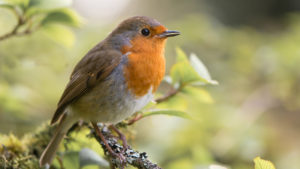
A Robin’s Diet in the Wild
The first thing a lot of people don’t realise is that Robins are ground feeders. They will come to bird tables but are only rarely, if at all, seen at feeders. This behaviour is a result of their diet in the wild. Robins get most of their protein from insects so love to forage woodland floors, fields and gardens for worms, beetles, and any other creepy crawlies that cross their path.
It is also this behaviour that has led to the Robin’s reputation for being very tamest around people. They will often follow someone digging their garden with apparently no fear at all and can get really quite close to people. They do this because they’ve learned that digging the garden means worms are brought to the surface and following hot on the heels of the gardener often results in a juicy meal.
Some people take this association even further by encouraging Robins to feed from their hands, something they will often do if you are patient and offer the right kind of foods.
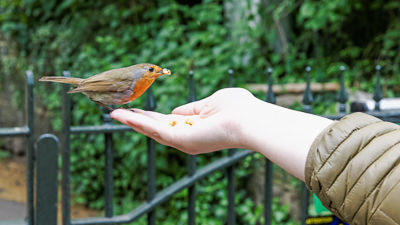
As well as insects, Robins love to dine on fruits, berries, seeds and nuts, which combine to give them the right amounts of protein, carbohydrates and fats they need to survive.
However, like all garden birds, Robins benefit most when their natural diet is supplemented by premium quality wild bird feed, helping them to not just survive, but thrive.
Feeding Robins
We’ve already discovered that Robins are predominantly ground feeders and rarely take food from hanging feeders. So, it is important that you either use ground trays (if you’re concerned about keeping your lawn clean and tidy), a bird table, or scatter food on the ground for them to find.
Scatter feed under and around shrubs and hedge bottoms, as this gives the birds shelter from the elements, particularly in winter, and protection from predators.
Finally, it is always a good idea to put out food in more than one area. For example, try scattering our Robin & Songbird mix on the ground and on a bird table. That way, you’re less likely to attract two males to the table, which will probably spend more time fighting than feeding!
You can also put Robin & Songbird mix in feeders to attract other species. Tits, Sparrows and Wrens particularly love this blend.
What to Feed Robins
Due to insects making up the bulk of a Robin’s diet, they will love Dried Mealworms or Dried Calciworms. One tip to make both these worms even more palatable is to soak them in water as this introduces valuable moisture into their diet. This is particularly valuable in springtime when adult birds are feeding young, as it makes the worms softer, and therefore easier, for their offspring to digest.
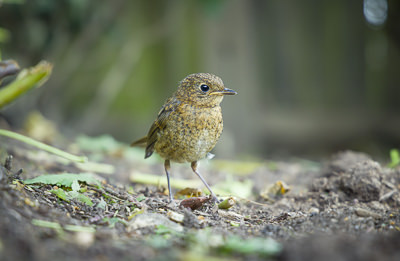
Juvenile robin or young baby European robin (erithacus rubecula) in a garden in spring, UK
Dried Calciworms, which are the larvae of the Black Soldier Fly, are generally considered an avian superfood as they contain around 50 times more calcium than other worms and insects.
This is crucial for maintaining a strong skeletal system and for egg development in the run up to nesting time.
Other individual foods Robins will love include Sunflower Hearts, Peanut Granules, and Suet Products which provide a great balance of fats and proteins. These enable birds to take on a lot of calories quickly and then move, which, being ground feeders, is one way they protect themselves against predators.
Pinhead Oatmeal is another excellent individual food to put out for Robins as it is high in carbohydrates, giving them slow release energy throughout the day.
Wild Bird Blends
When choosing a blend to feed to Robins, or any other species, pick a premium base blend that contains the majority of the nutrients they need in the right amounts. For Robins, we recommend our Robin & Songbird mix.
Robin & Songbird mix contains dried mealworms to provide fat and protein, as well as lots of small seeds which can be eaten quickly, which is vital for preventing predation.
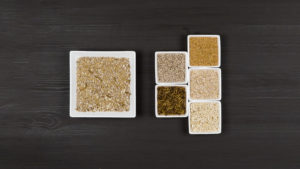 The full ingredients list includes Sunflower Hearts, Pinhead Oatmeal, Peanut Granules, Yellow Millet, Dried Mealworms, and Vegetable Oil.
The full ingredients list includes Sunflower Hearts, Pinhead Oatmeal, Peanut Granules, Yellow Millet, Dried Mealworms, and Vegetable Oil.
Robin & Songbird mix contains everything needed to keep these wonderful birds healthy and have them flocking to your garden.
Our Premium Wild Bird Food is also particularly good for Robins for the same reasons – it contains lots of high energy, small seeds, as well as suet.
However, Premium Wild Bird Food doesn’t contain Dried Mealworms, so if you are putting this out it is important to supplement with these or Dried Calciworms, to provide essential insectivorous proteins.
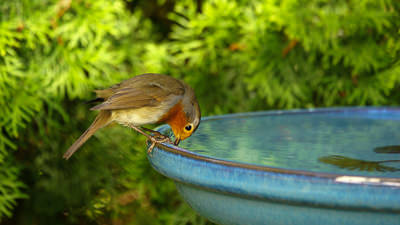
Water
Finally, when feeding Robins or any other bird, always put out a regular supply of fresh water. Water is essential for birds to drink, but they also love to bath in it, so it soon gets dirty. Replace it every day with a fresh top up, and in the winter, make sure to break up any ice that forms, to give birds access to the water below. By doing this, your feathered friends will repay you by filling your garden with beautiful colours and glorious bird song all year round.
Our recent posts giving advice and guidance on wild birds
Ground Nesting Birds
Ground Nesting Birds In an earlier article, we looked at nesting behaviour in wild birds and how you could use this knowledge to encourage birds to nest in your garden. In that article we talked about birds that nest in [...]
Incredible Journeys – Bird Migration Explained
Reading Time: 11 minutes While many species of bird make the UK their home all year round, some just visit for the summer or winter months and then head off to distance shores for the rest of the year. In this blog, we examine bird migration, taking a deep look into one of nature’s most spectacular phenomena to find out more about what makes it possible.
A Guide to Greenfinches
Reading Time: 9 minutes Greenfinches might not have the range of colours of their Goldfinch cousins, but they are still have a spectacular plummage. They are also viewed as one of the best starter birds you can buy by many aviary keepers because they tend to be fairly hardy, have a good song, and don’t have any specific needs that require the management of an experienced keeper.






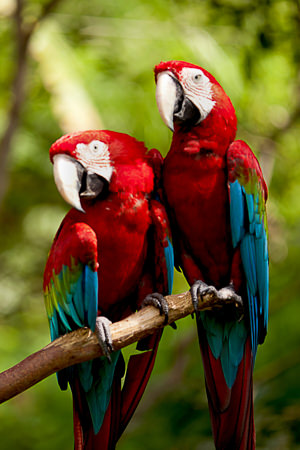
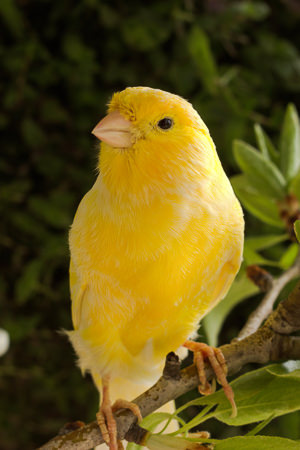
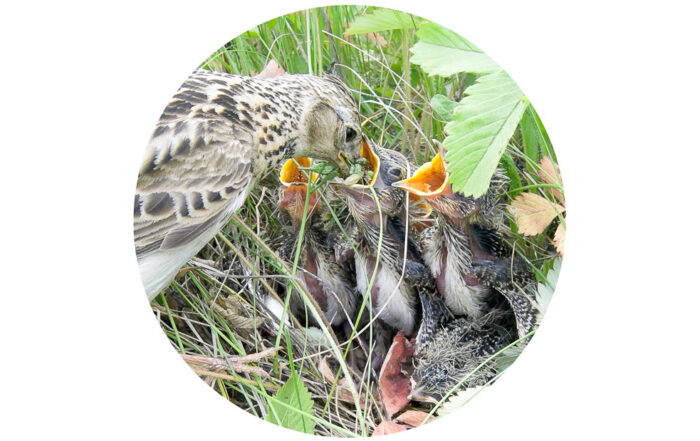

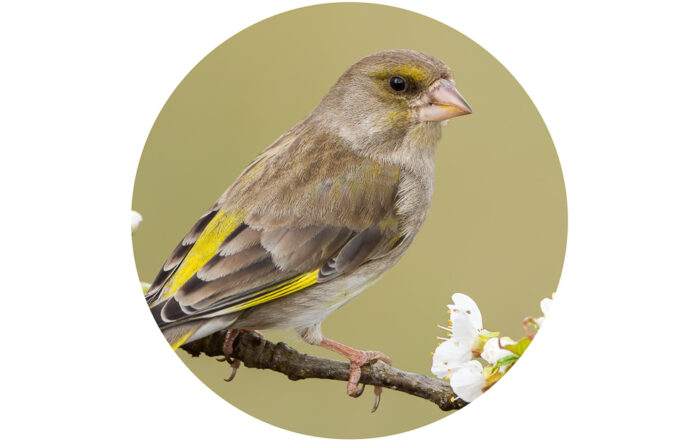
Leave A Comment